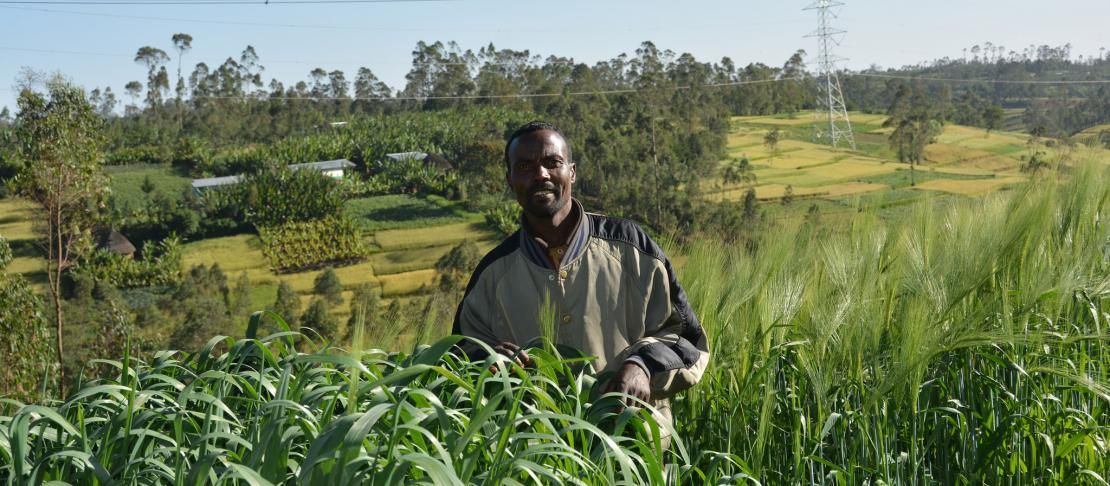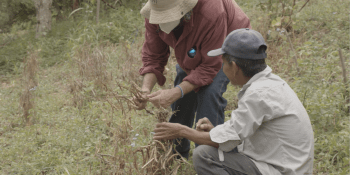Seminar and discussion | Scaling up climate-smart agriculture: challenges and opportunities

Launch of the CCAFS Learning Platform on Partnerships and Capacity for Scaling Climate-Smart Agriculture at the University of Leeds Priestley International Centre for Climate.
As the CGIAR Research Program on Climate Change, Agriculture and Food Security (CCAFS) enters its second phase, efforts to scale up climate-smart agriculture (CSA) have a greater focus through the cross-cutting Learning Platform on Partnerships and Capacity for Scaling CSA. The Learning Platform is the central mechanism for cohesion at national, regional and global levels; and manages global and continental-wide partnerships and impact pathways for climate change policy.
This event celebrates the launch of the Learning Platform at University of Leeds, where it will be hosted at the Priestley International Centre for Climate. The objectives of the event are to:
- explore ways to develop differentiated adaptation and development pathways that meet the needs of a diverse array of types of farmers and contexts;
- improve participants' understanding of challenges and opportunities to scale up CSA, drawing on experiences from CCAFS; and
- build on this understanding to identify priority actions for the Learning Platform.
Click below for session details and programs:
Participation is by invitation only. If you are interested in attending, please send an email to r.septivita@cgiar.org.
Session 1: Towards differentiated adaptation and development pathways for food systems
In essence, food and farming systems need to become more resilient to changes at multiple scales in order to support healthy and sustainable diets for the global population, whilst also meeting the non-food demands from agriculture in a fair way. Systemic shifts that activate adaptation and transformational pathways that support different types of farmers across the globe are needed.
In this context the session will aim to address the following questions:
- How can adaptation and development pathways be tailored to context and to the nature of the farming system?
- How can climate resilient development pathways ensure that inequalities are not be exacerbated?
- How can local decision-making and the maintenance of genetic diversity be promoted in differentiated adaptation and development pathways?
- What innovations in urban and peri-urban agriculture are needed to step up transformation?
The session will involve two keynote presentations, followed by a moderated panel discussion in a ‘chat show’ format to gather perspectives from experts on the framing questions.
Program
09:00 – 09:30 | Coffee |
|
09:30 – 09:40 | Opening remarks
| Andy Challinor, Professor of Climate Impacts, University of Leeds (Chair) |
09:40 – 09:50 | Keynote presentation Towards differentiated adaptation and development pathways for food systems | Laura Pereira, Research Fellow, City University of London |
09:50 – 10:00 | Keynote presentation Opportunities for North-South cooperation: case of the University farm | Steven Banwart, Leadership Chair in Integrated Soil / Agriculture / Water Research, University of Leeds |
10:00 – 10:25 |
Panel discussion: Towards differentiated adaptation and development pathways | David Howlett, Head of Policy, Global Resilience Partnership Laura Pereira, Research Fellow, City University of London David Harris, Senior Research Fellow, Bangor University and ICRISAT Cristina Talens, Director, Source Sustainable |
10:25 – 10:45 | Moderated Q&A and discussion |
|
10:45 – 11:00 | Closing comments from speakers, panellists and Chair |
|
11:05 – 11:30 | Coffee | |
Session 2: Scaling up climate-smart agriculture: challenges and opportunities
In response to the need for differentiated adaptation and development pathways for food systems, this session will focus on the role of CSA, and the challenges and opportunities in scaling up CSA to realise inclusive and sustainable rural development.
Specifically, the session will:
- Identify best practices and challenges in scaling up CSA.
- Identify priorities for the Learning Platform on Partnerships and Capacity for Scaling CSA.
A background note will be prepared ahead of the session, identifying best practices and challenges from CCAFS experiences in scaling up CSA. This will be complemented with insights from stakeholders including NGOs, private sector, researchers and investors, leading to a concrete set of priorities for the Learning Platform.
The session involves two keynote presentations, followed by a moderated panel discussion in a ‘chat show’ format with key stakeholder groups to identify challenges and opportunities from their perspectives.
Program
11:30 – 11:35 | Introduction to session objectives and speakers | Bruce Campbell, Program Director, CCAFS (Chair) |
11:35 – 11:45 | Keynote presentation The imperative for CSA: the climate challenge in agriculture | Andy Challinor, Professor of Climate Impacts, University of Leeds |
11:45 – 11:55 | Keynote presentation Scaling up CSA: the role of the Learning Platform on Partnerships and Capacity | Ana Maria Loboguerrero, Head of Global Policy Research, CCAFS |
11:55 – 12:05 | Q&A | |
12:05 – 12:25 | Panel discussion: Challenges and opportunities for scaling up CSA | Chris Brown, Vice President – Corporate Responsibility and Sustainability, Olam Andy Dougill, Dean of Faculty and Professor in Environmental Sustainability, University of Leeds Chris Henderson, Senior Policy and Practice Advisor in Agriculture, Practical Action Rima Al-Azar, Global Climate Governance Coordinator and CSA Team Leader, FAO |
12:25 – 12:40 | Moderated Q&A and discussion | |
12:40 – 12:50 | Closing remarks from panellists | |
12:50 – 13:00 | Closing comments | Alan Tollervey, Head of Agriculture Research, DFID |
Participation in both sessions is by invitation only. If you are interested in attending, please send an email to r.septivita@cgiar.org.


